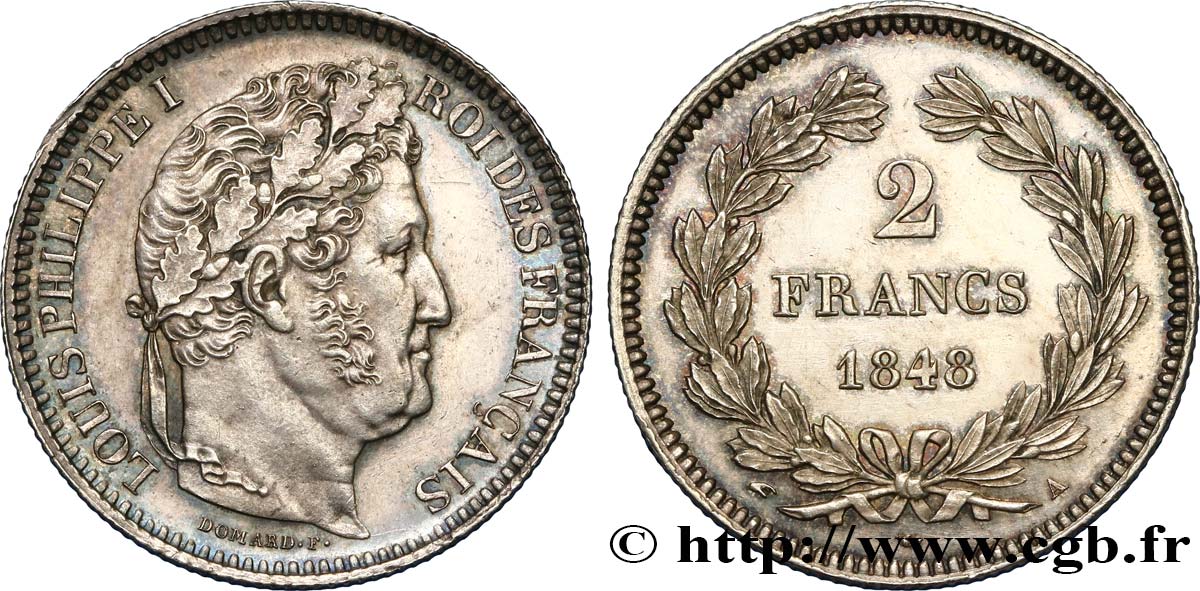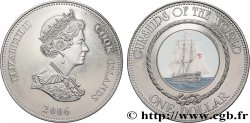Obverse
Obverse legend : LOUIS PHILIPPE I ROI DES FRANÇAIS.
Obverse description : Tête à droite de Louis-Philippe Ier coiffé d'une couronne de chêne dont l'une des extrémités du ruban qui la noue derrière la tête revient sur le cou ; signé DOMARD. F. au-dessous du cou contre le listel.
Reverse
Reverse legend : 2 / FRANCS.
Reverse description : en deux lignes, au-dessus de 1848, le tout dans une couronne nouée par un ruban à sa base, formée à gauche d'une branche de laurier, à droite d'une branche d'olivier ; au-dessous le différent du Graveur Général encadré à droite la lettre d'atelier A et à gauche du différent de Directeur.
Historical background
LOUIS-PHILIPPE I
(7/08/1830-24/02/1848)
Born in Paris in 1773, Louis-Philippe is the eldest son of Louis-Philippe Joseph, Duke of Orléans (Philippe-Égalité), guillotined in 1793 for corruption after having voted for the death of his cousin Louis XVI. He successively bears the titles of Duke of Valois, Chartres and Orleans from 1793. Favorable to the Revolution, like his father, he nevertheless had to take refuge in Switzerland then he traveled to Scandinavia, the United States and finally settled in England in 1801.. The Restoration allows him to find the immense possessions of his family but he remains considered as a potential rival by Louis XVIII who receives him coldly. Refugee in England during the Hundred Days, he returned to France in 1817. Greedy for gain, he gave his support to the opposition represented by the liberal party while relying on the possessing upper middle class.. The days of 1830 gave him the opportunity to come to power after having adhered to the tricolor flag and multiplied the promises. He became on July 31, 1830 lieutenant general of the kingdom then king of the French on August 7. His reign, under a liberal appearance, will become that of the bourgeoisie and business circles while the oppositions (Legitimists, Bonapartists, Republicans and Socialists) are maintained illegally.. His peace policy and his authority then earned him significant prestige with the European courts.. The banker Laffitte is Prime Minister. La Fayette is one of the architects of this "bourgeois revolution". On March 13, 1831, Casimir Périer replaced Laffitte. France intervenes in Belgium in August 1831 to counter the Dutch. The Legitimists, with the rue des Prouvaires plot, try to establish Henry V as king while his mother tries to raise the Vendée. She was arrested on December 3, 1832 in Nantes.. The cholera epidemic kills more than ten thousand people in Paris, including Casimir Périer. General Lamarque's funeral was the occasion for an attempted republican uprising, crushed in blood (see. Wretched). The French occupy Antwerp on December 23, 1832.. Fieschi's attack of July 28, 1835 against Louis-Philippe kills eighteen people including Marshal Mortier. The first Paris-Orléans railway line and the July column were inaugurated on October 24, 1837 and July 28, 1840 respectively.. The year 1840 marked a turning point in the regime, with great ministerial instability before having the Guizot ministry ("Get rich!").. Prince Louis-Napoleon Bonaparte, after a second putsch attempt, was sentenced to life imprisonment and locked up in Fort Ham from which he escaped in 1846. Napoleon's ashes are brought from Saint Helena and transferred to Les Invalides. From 1841, Louis-Philippe committed France to the path of the total conquest of Algeria, already begun under Charles X, while a major economic boom developed in Metropolitan France.. A law in 1841 limits child labor to 12 hours. The first serious railway accident took place on the Paris-Versailles line and caused 45 deaths on May 8, 1842. On July 13, the Duke of Orleans, the king's eldest son, died accidentally. On May 16, 1843, the Duke of Aumale took the smala of Abd-el-Kader who managed to escape. Bugeaud, Governor of Algeria, is made Marshal. 1843 is also the beginning of the Entente Cordiale and the visit of Queen Victoria to France. The French beat the Moroccans at Isly. Abd-el-Kader surrenders on December 23, 1847. The refusal of reforms leads to the fall of the regime during the Banquet Campaign and Louis-Philippe, dethroned on February 24, 1848, takes refuge in England after having abdicated in favor of his grandson..








 Report a mistake
Report a mistake Print the page
Print the page Share my selection
Share my selection Ask a question
Ask a question Consign / sell
Consign / sell
 Full data
Full data















